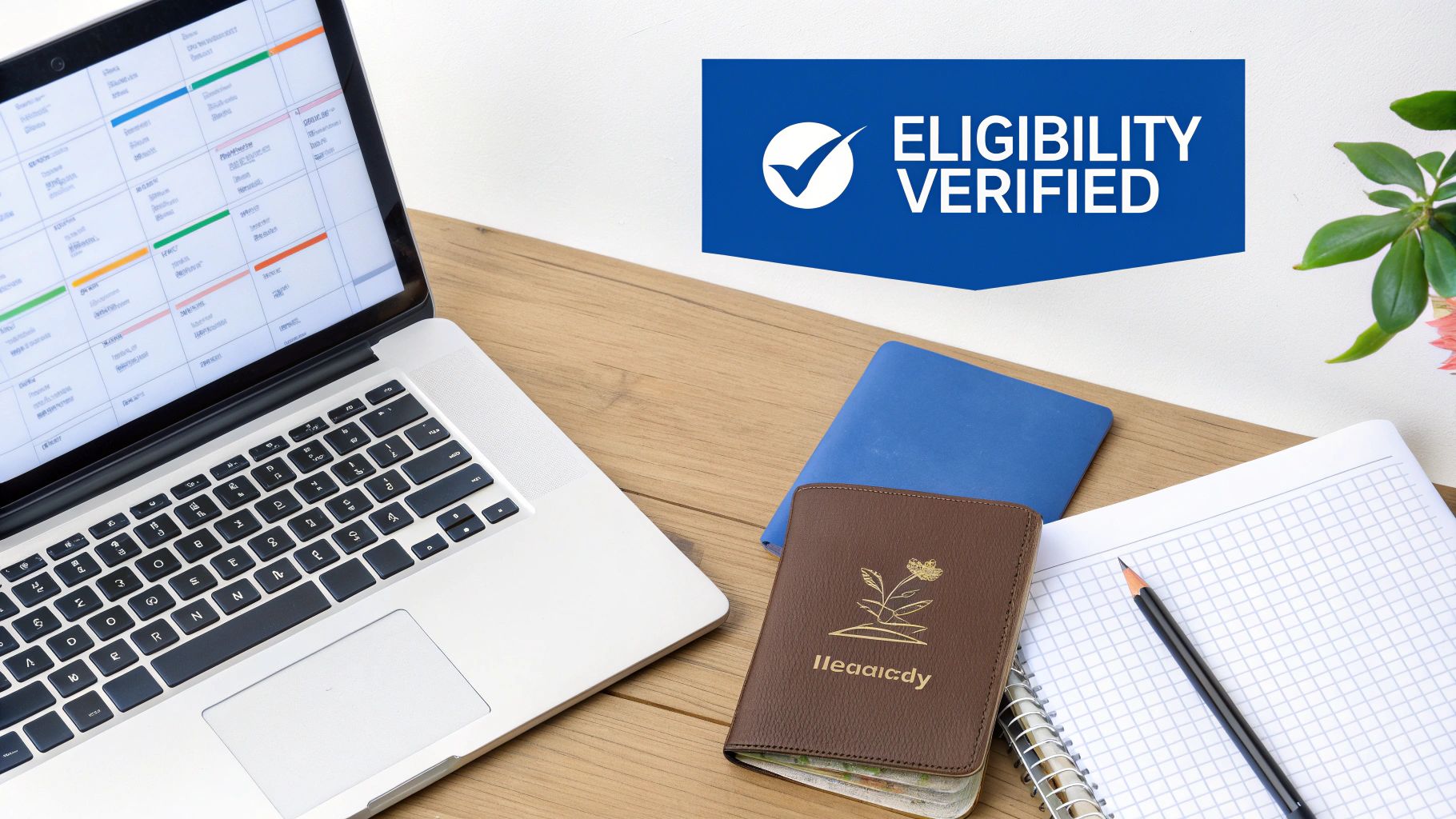UK Student Visa Requirements: Tips & Guide

Navigating UK Student Visa Types With Confidence
Choosing the right UK student visa is the first crucial step towards your academic journey. This requires understanding the different visa types and how they align with your individual study plans. Let’s explore the main options available for students hoping to study in the UK.
Understanding the Student Route (Formerly Tier 4)
The Student Route visa is the most common visa for individuals undertaking long-term study programs, such as bachelor’s or master’s degrees. This visa requires acceptance onto a course at a licensed Student sponsor, a UK educational institution approved by the Home Office. You’ll also need to demonstrate English language proficiency and prove you have sufficient funds to support yourself during your studies.
Short-Term Study Visa: A Flexible Option
For shorter courses or research programs, the Short-term study visa might be a better fit. This option is ideal for those planning to study in the UK for six months or less, or up to 11 months for an English language course. Keep in mind that this visa typically doesn’t allow for extensions or switching to another visa category within the UK.
The Graduate Route: Bridging Study and Work
The Graduate Route offers a unique opportunity for international students who have successfully completed their degrees. This route allows graduates to stay in the UK for two years (or three years for PhD graduates) to work or look for work, without needing sponsorship. This is a significant benefit for those hoping to gain valuable UK work experience after graduation.
Recent Changes Impacting UK Student Visas
Staying informed about the current UK visa landscape is crucial for a successful application. Recent changes in UK student visa requirements have significantly impacted application trends. For example, the UK experienced a decline in sponsored study visas in 2024, largely due to policy changes like the dependants ban. Implemented in January 2024, this policy restricts many international students from bringing their family members, notably affecting Nigerian students who saw a 55% decrease in visa issuances. More detailed statistics can be found here: https://monitor.icef.com/2025/03/uk-reduced-demand-from-india-nigeria-and-bangladesh-drive-a-14-decline-in-sponsored-study-visas-in-2024/
The following table provides a comparison of the various UK student visa types:
UK Student Visa Types Comparison
This table compares the different UK student visa types, their duration, eligibility criteria, and key features.
| Visa Type | Duration | Eligibility | Key Features | Application Fee |
|---|---|---|---|---|
| Student Route | Up to the length of your course + some additional time | Licensed Student sponsor acceptance, English language proficiency, proof of funds | Allows for long-term study, potential for extension | Varies based on nationality and course length |
| Short-term study visa | 6 months (or up to 11 months for English language courses) | Course acceptance, proof of funds, intention to leave UK after studies | Suitable for short courses or research programs | Varies based on nationality and course length |
| Graduate Route | 2 years (3 years for PhD graduates) | Successful completion of a UK degree at a licensed Student sponsor | Allows graduates to work or seek work without sponsorship | No fee (applied for alongside your Student Route visa) |
These policy adjustments highlight the importance of staying updated on the latest UK student visa requirements before starting your application process. Choosing the correct visa category and understanding its requirements is paramount for a successful outcome.
Essential Documents That Get Your Visa Approved
Securing your UK student visa depends heavily on providing the correct documentation. It’s similar to constructing a building – a solid foundation of documents is essential. This section will guide you in preparing a compelling application.
Confirmation of Acceptance for Studies (CAS): Your Golden Ticket
Your Confirmation of Acceptance for Studies (CAS) is a unique number issued by your UK university or college. This essential document confirms your acceptance onto a specific course and is absolutely required for your visa application. It’s your golden ticket to studying in the UK. Obtain your CAS well in advance and double-check its accuracy.
Financial Evidence: Showing You Can Support Yourself
Demonstrating your financial stability is crucial. You must provide evidence that you can afford tuition and living expenses throughout your studies. Acceptable documentation includes bank statements, loan letters, or scholarship awards. Organized and consistent records are key. Inconsistent balances or large, unexplained deposits in your bank statements can be problematic. For more guidance, consider these personal branding tips, which can be helpful for presenting yourself effectively.
Passport and English Proficiency: Essential Credentials
A valid passport with sufficient remaining validity is mandatory. You must also demonstrate English language proficiency through approved tests like IELTS or TOEFL. Ensure your scores meet university and UK Home Office requirements. You might also find this resource helpful: How to master… for further tips on navigating the financial aspects of your application.
Tuberculosis Test Results and Academic Credentials: Don’t Overlook These
You might need to provide tuberculosis test results depending on your country of origin. This is a critical health requirement, so address it promptly. Your academic credentials are equally important and should be authenticated and translated if necessary. Inconsistencies or missing documents can weaken your application.
Additional Documents: Strengthening Your Application
While the documents above are essential, supplementary materials can strengthen your application. A well-written letter of intent outlining your academic goals and reasons for choosing the UK can add valuable context. These additional documents bolster your application. Every detail matters, so ensure your documentation tells a compelling story.

The following table summarizes the key documents required for a UK student visa application. It highlights potential pitfalls and offers specific instructions to help streamline your preparation process.
UK Student Visa Document Checklist: A comprehensive checklist of all required documents for UK student visa applications with notes on their importance and special requirements.
| Document Type | Requirement Level | Special Instructions | Common Mistakes |
|---|---|---|---|
| Confirmation of Acceptance for Studies (CAS) | Mandatory | Obtain from your university/college; verify accuracy | Applying before receiving CAS; inaccuracies in CAS details |
| Financial Evidence | Mandatory | Bank statements, loan letters, scholarship awards; demonstrate sufficient funds | Insufficient funds; inconsistent or unexplained transactions in bank statements |
| Passport | Mandatory | Sufficient remaining validity | Expired passport; insufficient validity remaining |
| English Proficiency Test (IELTS/TOEFL) | Mandatory (for most courses) | Meet university and UKVI requirements | Not achieving the required score; using an unapproved test |
| Tuberculosis Test Results | Mandatory (for some nationalities) | Obtain from an approved clinic | Not obtaining results before applying; using an unapproved clinic |
| Academic Credentials | Mandatory | Transcripts, certificates; translated if not in English | Missing documents; not providing official translations |
| Letter of Intent | Recommended | Clearly state academic goals and reasons for choosing the UK | Generic or unconvincing letter; not tailoring the letter to the specific course |
Reviewing this checklist thoroughly will ensure you have all necessary documentation, improving your chances of a successful visa application. Remember, meticulous preparation is key to a smooth and stress-free visa process.
Meeting Financial Requirements Without Stress
Financial evidence is a crucial part of the UK student visa application process. Insufficient documentation is a leading cause of visa rejections. This section breaks down the UK student visa financial requirements, focusing on demonstrating financial stability and making your visa application journey smoother.
Understanding the Financial Thresholds
You must prove you have enough money to cover your tuition fees and living expenses for your entire study period. The precise amount depends on factors like your chosen university and whether you’ll be in Inner London or elsewhere in the UK. London has a higher cost of living, so you’ll need to show more funds. It’s similar to budgeting for two different cities in Nigeria – Lagos, being more expensive, requires a larger budget than, say, Ibadan.
Inner London vs. The Rest of the UK: A Crucial Distinction
For students in Inner London, the required maintenance (living expenses) for nine months is currently £1,334 per month. Outside Inner London, it’s £1,023 per month. This difference reflects the varied cost of living across the UK. Your study location significantly impacts the total funds you need to show.
Acceptable Sources of Funding: What Counts and What Doesn’t
The UK Home Office accepts various funding sources:
- Personal Savings: Bank statements showing consistent savings over a set period.
- Education Loans: A loan approval letter from a recognized financial institution.
- Official Sponsorships: Documents confirming support from a government or recognized organization.
- Family Support: Proof of funds from a family member, with a letter confirming their support.
Some sources aren’t easily accepted, like informal loans or undocumented income. These can raise concerns with visa officers, so it’s best to stick to the established options above.
Proving Your Financial History: Documentation Is Key
A clear, consistent financial history is essential. Your bank statements should show regular deposits and avoid large, unexplained transactions. Think of your financial history as a story – it must be logical and believable to convince the visa officer of your genuine student status. For helpful tips, check this Financial Statement Review Checklist. You can also find more financial management resources on JapaChat.

Real-World Examples: Learning From Success Stories
Many Nigerian students have successfully met these financial requirements. Some combined personal savings and parental support, while others secured education loans from UK Home Office-recognized Nigerian banks. Learn from their experiences to develop a strong financial strategy for your UK student visa application. Meticulous planning and accurate documentation are key. JapaChat, a platform for Nigerians relocating abroad, offers further help and support.
Your Week-by-Week Visa Application Action Plan
Transforming the UK student visa application process from a daunting ordeal into a manageable journey requires a structured approach. This week-by-week action plan provides a roadmap, helping you navigate each stage effectively.
Week 1: Getting Organized and Starting Your Application
Begin by creating your online application profile on the UK government website. This involves setting up an account and familiarizing yourself with the online platform. Creating a solid week-by-week action plan can be made easier with a reliable checklist. For example, a Financial Statement Review Checklist can be a helpful resource. Next, gather your essential documents, such as your passport and Confirmation of Acceptance for Studies (CAS). Having these ready early streamlines the later steps. It’s similar to packing for a trip – preparation prevents last-minute stress.
Week 2: Completing the Online Application and Paying the Fee
This week, focus on meticulously completing each section of the online application form. Double-check for accuracy and consistency, as errors can cause delays. Careful attention to detail is crucial. Once completed, pay the visa application fee and keep the payment confirmation safe for future reference.
Week 3: Booking Your Biometric Appointment
Securing a biometric appointment is the next step. This involves providing your fingerprints and photograph. Aim for a convenient time and location. During peak seasons, slots fill up quickly, so book yours as soon as possible. This is especially important for applicants in Nigeria, where appointment availability can be competitive.
Week 4: Attending Your Biometric Appointment and Uploading Documents
Attend your biometric appointment fully prepared. Bring your passport, appointment confirmation, and all supporting documents. Ensure your documents are correctly formatted and translated if necessary. Afterwards, upload any remaining documents to your online application, completing the submission phase.
Week 5-8: Tracking Your Application and Preparing for an Interview
The waiting period can be a source of anxiety. Actively track your application status online using the provided reference number. Some applicants may be required to attend a credibility interview. If called for one, prepare thoroughly by reviewing your application and practicing your answers. Demonstrating your genuine intention to study in the UK is key.
Week 9-12: Decision and Contingency Planning
By this point, you should receive a decision on your visa application. If successful, congratulations! If not, consider your options. Contingency planning is important. Explore options like administrative reviews or reapplications. Understand the reasons for the refusal and address them strategically in any potential reapplication.
This week-by-week plan offers a framework for your UK student visa application. However, processing times can vary, so stay updated with the latest information on the UK government website. JapaChat can also provide support during this process.

Adapting to Critical Visa Requirement Changes
The UK’s immigration landscape is in constant flux. Staying up-to-date on the latest UK student visa requirements is essential for a successful application, especially for those applying from Nigeria, where seemingly minor changes can have a substantial impact. This section explores key shifts and their implications for your application strategy.
From Tier 4 to the Student Route: Understanding the Transition
A major change was the shift from the Tier 4 visa to the Student Route. While similar in function, this transition introduced a points-based system. Applicants now accrue points based on various criteria, including a Confirmation of Acceptance for Studies (CAS), English language proficiency, and demonstrable financial stability. Grasping this points-based system is crucial for a robust application.
The Graduate Route: New Opportunities for Post-Study Work
The Graduate Route presents exciting post-graduation opportunities for international students. It allows graduates to remain in the UK for two years (or three years for PhD graduates) to work or seek employment without sponsorship. This offers valuable UK work experience, especially beneficial for Nigerian graduates aiming to boost their career prospects. Learn more with our guide on how to make the most of the Graduate Route on JapaChat.
Changes to Dependant Policies: Navigating New Family Considerations
Changes to dependant policies introduce vital considerations for applicants with families. The dependant ban implemented in January 2024, for example, restricts many students from bringing family members, significantly impacting Nigerian applicants. Understanding these policies and their relevance to your situation is paramount.
Updated Financial Thresholds and English Testing Requirements
Keeping abreast of updated financial thresholds is essential. The required amount varies depending on your study location (Inner London vs. elsewhere). Similarly, stay informed about changes to English testing requirements, as achieving the specified scores is mandatory.
Navigating Credibility Assessments: Demonstrating Genuine Intent
UK visa officers place increasing emphasis on credibility assessments. They scrutinize your application’s overall coherence and the consistency of your statements and supporting documentation. Inconsistent financial records or gaps in your academic history, for instance, can trigger concerns. A well-organized application with supporting evidence clearly demonstrating your genuine study intentions is vital. This proactive approach helps preempt potential issues and strengthens your case for visa approval.

By understanding and adapting to these evolving UK student visa requirements, particularly for Nigerian applicants, you can improve your chances of a successful application. Stay informed on the latest details and adjust your strategy accordingly.
Avoiding the Mistakes That Cause Visa Rejections
Securing a UK student visa is a significant step, and unfortunately, avoidable mistakes can derail the entire process. This section highlights common pitfalls and offers strategies to navigate them, increasing your chances of approval on your first attempt. This is particularly important for applicants from Nigeria, where applications often face increased scrutiny.
Consistency Is Key: Aligning Statements and Evidence
One of the most frequent reasons for UK student visa rejections is inconsistency. This occurs when the statements made on your application don’t match the supporting documents. For example, claiming sufficient funds while providing bank statements with insufficient balances will raise red flags. Think of it like this: telling someone you own a house in Lekki but then showing them pictures of a flat in Yaba. The discrepancy damages your credibility. Ensure your statements perfectly align with your evidence.
Documenting Finances: Precision and Clarity Matter
Errors in financial documentation are another common pitfall. Incomplete bank statements, missing financial details, or incorrectly formatted documents can lead to rejection. Attention to detail is paramount here. Your bank statements must cover the required period, clearly display your name and account details, and be officially stamped by your bank. Further guidance on presenting financial documents can be found on JapaChat.
Credibility Interviews: Preparation Is Crucial
Some applicants are invited to a credibility interview. This interview assesses the genuineness of your intentions to study. Lack of preparation can lead to nervousness and inconsistent answers, which can negatively impact your application. Practice answering common interview questions about your chosen course, university, and future plans. This preparation builds confidence and allows you to clearly articulate your intentions. For more information, check out this helpful resource: How to master the visa interview on Japachat.com.
English Language Requirements: Meeting the Standard Convincingly
Failing to meet the English language requirements or submitting invalid test results can lead to automatic rejection. This is a non-negotiable requirement. Ensure your test scores meet both university and UK Home Office standards. Double-check the validity of your results and ensure they are submitted correctly.
Technical Submission Errors: Avoiding Preventable Rejections
Technical issues, such as uploading documents in the wrong format or missing deadlines, can cause preventable rejections. Familiarize yourself with the online application system and carefully follow all instructions. This helps avoid frustrating technical errors that could jeopardize your application.
Misinterpreted Requirements: Clarity Is Essential
Misinterpreting UK student visa requirements, particularly regarding financial thresholds or documentation specifics, can lead to costly errors. Thoroughly research the requirements applicable to your situation. Consulting with an immigration advisor can also provide valuable clarity. This proactive approach prevents submitting an incomplete or inaccurate application. By addressing these potential pitfalls, you significantly improve your prospects of securing your UK student visa.
Country-Specific Strategies for Application Success
Your nationality plays a significant role in your UK student visa application. UK student visa requirements vary based on your country of origin, influencing the process and your approval chances. This section examines these nuances, focusing on applicants from Nigeria.
Differential Evidence and Documentation Requirements
The UK operates a differential evidence category, affecting required documents based on nationality. Some countries are low-risk, while others face higher scrutiny. Nigeria often falls into the latter category, meaning Nigerian applicants may need more comprehensive documentation. For example, while a simple bank statement might suffice for some, Nigerians might need additional proof of funds, like employment letters or business registration documents.
Navigating Higher Scrutiny: Strategies for Success
Applicants from regions facing higher scrutiny should proactively address potential concerns. It’s like preparing for a tough exam – anticipating questions helps you excel. For Nigerian applicants, demonstrating strong ties to Nigeria, such as family or property, can be beneficial. This assures visa officers of your intention to return after studies. A well-structured application reinforces your genuine student intentions.
Country-Specific Advice: Interviews, Finances, and Timing
Insights from successful Nigerian applicants offer valuable advice. They often suggest practicing for credibility interviews, articulating study plans and post-graduation goals. Tailoring financial documentation to align with common Nigerian financial practices, such as providing documentation from family sponsors with evidence of their financial stability, can strengthen your application. Understanding optimal application timing based on Nigerian processing times avoids delays.
Want a smoother UK visa application experience? JapaChat offers personalized support for Nigerians. Sign up free and discover how our AI-powered platform can simplify your relocation.
Comments
2 responses to “UK Student Visa Requirements: Tips & Guide”
-
[…] vibrant Chevening community, connecting them with a vast network of global professionals. You can learn more about Chevening Scholarships to help you with your UK student visa application […]
-
[…] The J-1 visa facilitates exchange visitor programs, promoting cultural and educational exchange between the U.S. and other nations. These programs cover a wide range of activities, including academic studies, research, professional training, and cultural immersion. Unlike the F-1 and M-1 visas, the J-1 often includes a two-year home residency requirement. This mandates returning to your home country for two years after completing the program before applying for certain other U.S. visas. This requirement can significantly impact future plans, so careful consideration is essential. You might be interested in: UK Student Visa Requirements. […]

Leave a Reply